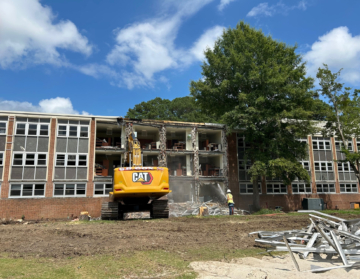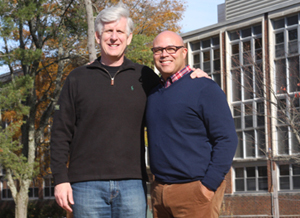A new era of William & Mary living and learning spaces is officially underway. Over the course of 10 years, W&M will renovate or replace 80% of its campus residences and provide two new, modern dining spaces in a complete transformation of the on-campus experience.
Phase one of the $700-plus million comprehensive housing and dining facilities project began in July. The first new student housing is anticipated to open in fall 2025.
“This project reflects our steadfast commitment to meeting the needs of students today and of generations to come,” said Ginger Ambler, vice president for student affairs. “We have kept students at the center of this ambitious project, designing beautiful, innovative spaces that will allow them to thrive in community with one another.”
Construction began in July with site preparation and demolition work on Yates Hall to make way for the university’s planned West 1 development. Earlier in July, W&M finalized the project’s phase one public-private partnership with Balfour Beatty Campus Solutions as part of financing for its 10-year residential and dining comprehensive facilities plan.
“William & Mary’s leadership has been clear-eyed about the needs of their students and their goals for a more sustainable future,” said Balfour Beatty Campus Solutions Vice President Amy Aponte ’94, M.A. ’96.
The Housing & Dining Comprehensive Facilities Plan aligns with William & Mary’s Vision 2026 to position the university to meet future strategic needs. It’s also part of the university’s new Campus Comprehensive Plan, which will be completed in the fall of 2025 as part of the Campus Master Plan, and includes a Learning Spaces Plan and Landscape Plan. The comprehensive plan provides a robust framework focused on living, learning and working, and the landscapes in which they take place.
The first phase of the plan will deliver new housing for 935 students on the west campus where Yates was located (the West Woods site), as well as housing for 269 students in a new facility adjacent to Lemon and Hardy halls along Jamestown Road.

Two small brick buildings adjacent to Yates that were part of the Civilian Conservation Corps Camp during the Great Depression are being preserved for continued use by Facilities Management. The dependencies will be relocated to university property on South Henry Street.
Ambler said the university is documenting changes at the site of Yates Hall with photographs and working closely with project leadership to secure artifacts, such as bricks, from the former residence hall.
“We know alumni who were former residents of Yates Hall have very special memories of their time there and the relationships they built in their freshman dorm,” Ambler said.
The new residence halls, configured into modern living units and community spaces, will include geothermal heating and cooling in support of W&M’s Climate Action Roadmap, which calls for a carbon-neutral campus by 2030. As part of the project, fossil fuel-dependent systems in Lemon and Hardy halls will also be transitioned to geothermal energy.
On the West Woods site, a new 50,000-square foot dining facility will become the signature eatery on campus, offering patrons a serene dining experience nestled in the wooded site.

The project was designed by VMDO Architects in collaboration with CMTA and W&M leadership. Construction will be conducted by Balfour Beatty’s buildings division and Richmond-based Kjellstrom+Lee.
“We are fortunate to have built an outstanding team of staff, contractors and partners who were able to successfully embark on transformational additions to campus that will benefit our community for decades to come,” said Sean Hughes, interim associate vice president of business affairs.
The phased approach accounts for the smart enrollment growth plan already underway and provides predictable residential capacity even as the university takes housing facilities offline for renovations, Hughes added.
The university is using a multi-faceted approach to develop and fund different aspects of the plan through a combination of traditional university financing, leveraging its relationship with the William & Mary Real Estate Foundation and seeking public-private partnerships with third party developers.
Phase 1
Phase 1 includes renovation of Old Dominion and Monroe halls; construction of a new dorm to complete the planned Lemon and Hardy halls triangle; demolition of Yates Hall to build new campus housing referred to as West 1, construction of a new West Campus dining facility, demolition of Campus Center; and the replacement of the Green and Gold Village and the Commons Dining facility. The cost for Phase 1 is estimated at $320 million, leveraging W&M expertise for the renovation of Old Dominion and Monroe and using a public-private partnership for the construction of new facilities.
Phase 2
Phase 2 involves redevelopment of the current Campus Center site to include new construction of student housing, a dining facility, admission office and bookstore, as well as redeveloping the Randolph Complex site for a new dormitory facility; redeveloping the Richmond Hall site; new property development; upgrading One Tribe Place and demolition of the Botetourt Complex. The cost for Phase 2 is estimated at $350 million depending upon the programming, design and timing. A partnership with the W&M Real Estate Foundation will be used for the Campus Center site, Richmond Hall replacement and future property development with a public-private partnership planned for the West Campus housing site.
Phase 3
Phase 3 consists of developing student housing at a West Campus site to be determined, renovation of four residence halls — Barrett, Jefferson, Bryan, and the Sorority Complex, as well as renovating the Lettie Pate Whitehead Evans Graduate Complex and demolishing DuPont Hall. Costs for Phase 3 are anticipated between $100 million and $200 million using a public-private partnership for the new construction.
Staff, University News & Media


